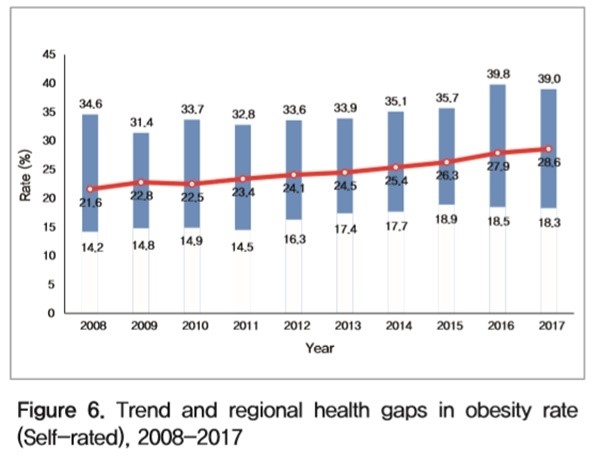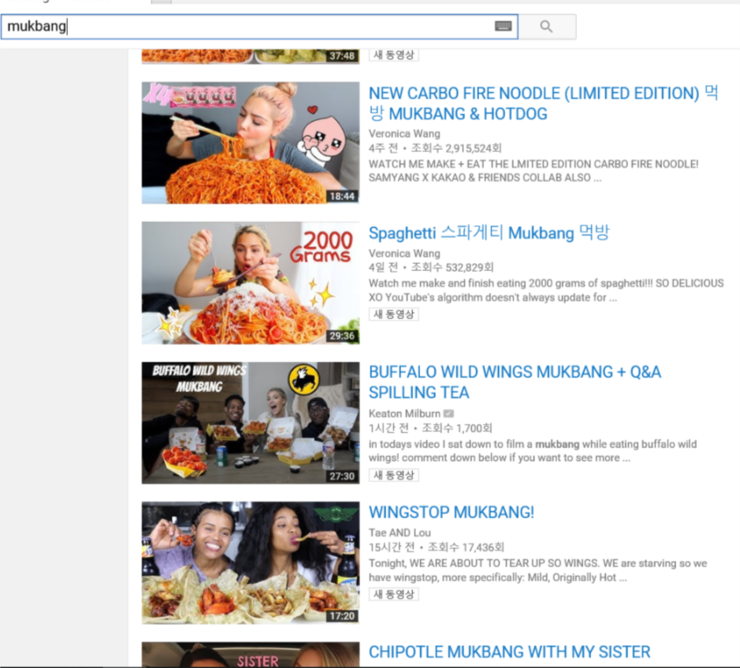A high obesity rate is massive social problem in our modern society and there diverse efforts are being made to solve the problem. On July 26, the Minister of Health and Welfare (MOHW) announced the ‘National Obesity Supervision Comprehensive Countermeasures’ in an effort to decrease the national obesity rate. On the surface, the policy direction seems like a rational approach, but controversy has ensued because the regulation included the restriction of ‘Mukbang’ (an expression used to describe online eating broadcasts). The MOHW announced new guidelines and systematical monitoring programs for these online broadcasts simply because they believe that Mukbang encourages obesity. In other words, the Korean government’s new regulations aimed at discouraging obesity is discouraging the content creator’s services, which are based on the overeating of food, violating their freedom to create content without garnering any positive effects on the problem of obesity.
 |
| ▲ One of the most popular mukbang YouTube bj named 'Banzz's broadcasting scene. (Photo by Kids Donga) |
The government’s position is clear. In their view, the more people watch mukbang, the more people eat the featured high calorie foods, leading to a rise in the nation’s obesity rate. They believe there is a direct link between viewing mukbang and our higher obesity rate.
 |
| ▲ This graph shows Korea's obesity rate from 2008 to 2017. (Photo by Cookie News) |
However, this opinion has no scientific evidence to back it up. Obesity is caused by diverse factors, but Mukbang has never been scientifically linked to encouraging obesity. In fact, supporters of Mukbang argue that the online shows help viewers regain their appetite or can even control it through the satisfaction of watching Mukbang. Furthermore, not all people watch mukbang to eat food. For example, according to a Segye Times article about the mukbang regulations, one of the interviewees said that she watched mukbang the most while she was on a diet. She gets satisfaction by watching the content creator eating food. Another interviewee also said he watched mukbang at night, so he wouldn’t eat food at night. In a Gyungnam Maeil article, Park Jung-Pil a department of internal medicine expert argued “the main reason for the obesity rate increase is the irregular lifestyle of modern people. Modern people eat more, but exercise less.” As a result, obesity is caused by various social and lifestyle reasons.
Moreover, the proposed regulation plan has no clear standard for effective implementation. According to MOHW guidelines, TV broadcasts and advertisements will be regulated. However, mukbang content also appears on AfricaTV (an independent broadcasting platform), Youtube and Instagram. The Korean government cannot regulate these diverse platforms, so there’s no point in trying to do so locally. Search results come up with 3.3million sites for mukbang on YouTube and that is only the English search results. If we add other languages the results would be even higher. Furthermore, there are other TV programs, dramas, or even movies abroad that contain Mukbang like the Japanese drama Solitary Gourmet. This means, if the government wants to regulate Mukbang, they would have to consider lots of content from a number of different platforms, requiring a large budget to track all these sources down.
 |
| ▲ This picture shows the 'mukbang' search result in YouTube. About 3.3 million mukbang is searched. |
More importantly, regulating mukbang violates our freedom of choice to view our own preferred content. Even though a high obesity rate causes lots of social problems, violating our right of expression to watch content, that has not been proven linked to the issue, is not a valid enough reason to regulate it. Of course, there are times when content should be regulated by the government. For instance, alcohol, high energy drinks and unhealthy food are regulated as to the alcohol degree or the advertisement time. According to the National Health Promotion Act’s enforcement ordinances, alcohol advertising is banned from 7A.M. to 10P.M. because there is definite relationship between the ads and exposure frequency. According to the MOHW and Korea’s Health Promotion Institute research in 2017, the more ads viewers are exposed to the possibility of drinking becomes about 1.15 higher than for individuals who were not exposed to any ads. In the case of mukbang, there is no evidence proving a direct link between viewing the content and overeating, so it is a clear violation of the creator’s freedom to produce this type of content. Freedom of expression is our most basic right, so it shouldn’t be regulated without gaining a clear greater good.
Mukbang started in 2008 and now, it is one of the most popular broadcasting and media themes available to the public. Each broadcasting station has at least 1 mukbang broadcast and viewer’s accessibility has improved. After MOHW announced its intention to regulate mukbang viewership, the general public was opposed to the idea and launched the Cheongwadae petition.
It is for the government to decide upon rules and regulations that serve the greater good. However, they must still be based on valid concerns and handled by reasonable solutions. Since there is no evidence to demonstrate correlation between mukbang and our increased obesity rate, they should have not addressed the problem with such a restrictive regulation.
신지희 dankookherald@gmail.com

![[Campus Magnifier] Let's Surf the Library!](/news/photo/202404/12496_1765_4143.jpg) [Campus Magnifier] Let's Surf the Library!
[Campus Magnifier] Let's Surf the Library!
![[Campus Magnifier] Let's Surf the Library!](/news/thumbnail/202404/12496_1765_4143_v150.jpg)





